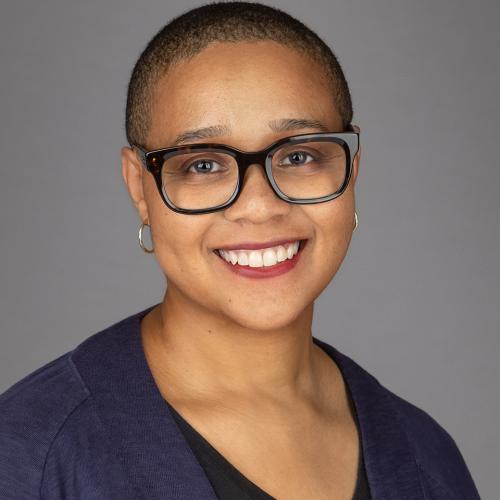As the calls for banning books in schools and libraries have increased exponentially in recent years, so have the requests for scholarly responses from Associate Professor Emily Knox, who has focused her career on studying intellectual freedom, information access and ethics, and book banning.
Knox foresaw recent trends when she wrote her 2015 book, Book Banning in 21st-Century America. Since then, events such as the COVID-19 pandemic, George Floyd murder and subsequent protests, and the January 6, 2021, insurrection of the U.S. Capitol have shaken the stability of the country, moving it, Knox maintains, to a society split among the majority and minority.
According to Knox, this anxiety has contributed to the most attempts to ban books since the American Library Association (ALA) began tracking challenges over twenty years ago. PEN America, a nonprofit group that works to defend and celebrate free expression through advancing literature and human rights, reported 138 school districts in 32 states banned more than 2,500 books during the 2021-22 school year.
Most of the books that raised objections touched on topics of race, sex, sexual orientation, and gender. Historically, book challenges have originated from both sides of the political spectrum, but conservatives have recently generated the most, Knox said.
The ALA Office for Intellectual Freedom took the unprecedented step of releasing mid-year statistics on book challenges. This year will outpace 2021, which already had the highest number of challenges in the twenty years since ALA began collecting data. Knox, who serves as editor of the Journal of Intellectual Freedom and also is chair of the National Coalition Against Censorship Board of Directors, has been asked to present talks, serve on panels, and give interviews that discuss this phenomenon.
In 2022, Knox has given over 25 invited talks on banned and challenged books, including the keynote at Obscenity! Blasphemy! Treason!: An Interdisciplinary International Conference on Censorship at National Taiwan University and the 2022 Masha Dexter Lecture on Gender, Sexuality, and Public Policy at Brown University. She has also served on panels for the University of Washington Information School and SAGE publications.
In March, Knox served as moderator for a PEN America/Penguin Random House virtual program, "Banned Books: When Books are Threatened, Where Do We Turn?," with Ibram X. Kendi (How to Be an Antiracist), Nikole Hannah-Jones (The 1619 Project), and Nic Stone (Dear Martin). The program, which was open to the general public, had over one thousand attendees. She also moderated another panel in September with authors Renée Watson, Kim Johnson, Kyle Lukoff, and Hannah-Jones for PEN America/Booklist.
Knox has been interviewed for major U.S. news outlets, including NPR National, Time, and The Washington Post as well as WHYY's Radio Times, WBEZ's Nerdette Podcast, WILL's The 21st Show, and WPFW's We the People. Book banning has caught the interest of international news as well, and Knox has shared her research expertise with L'Express (France), De Standaard (Belgium), and Radio France Internationale.
"When discussing book banning, I try to present a deeper understanding of why people try to remove books from public institutions. My analysis is based in what I call the 'discourse of censorship,' which examines how people understand their identities and power within communities as well as the nature of knowledge, in order to influence the values that are taught or represented in public schools and libraries," Knox said.
Book banning is one of the areas examined in Knox's latest book, Foundations of Intellectual Freedom, which extends beyond censorship and presents a broader picture of topics including hate speech and social justice.
"This book is basically an overview of my intellectual freedom and censorship course at the iSchool, which I have taught most years since 2012. It provides a holistic view of intellectual freedom and is rooted in the idea that all individuals have the right to freedom of expression and access to information," Knox noted. "Although it is primarily focused on the United States, it does provide some information on how intellectual freedom is understood internationally. We are living through a time when people's right to intellectual freedom is questioned, and the book will give students, information professionals, and other interested people an understanding of why this right matters."
In addition to book banning and internet filtering, Foundations of Intellectual Freedom addresses topics such as the historical and legal roots of intellectual freedom; the intersection of intellectual freedom, freedom of expression, and social justice; professional values and codes of ethics; pro- and anti- censorship arguments; privacy and its relationship to information services; and emerging global issues and their impact on future intellectual freedom.
"I plan to focus my future research on the intersection of intellectual freedom and social justice," said Knox. "Understanding why diverse books have been targeted in this latest wave of book challenges and how librarians, teachers, and others can respond effectively is vital for ensuring that these books can remain accessible."
Knox received her PhD from the doctoral program at the Rutgers University School of Communication & Information. Her master's in library and information science is from the iSchool at Illinois. She also holds a BA in religious studies from Smith College and an AM in the same field from The University of Chicago Divinity School.
